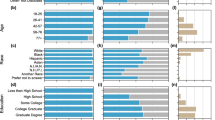Abstract
Today, digital and mobile forms of data collection are increasingly being used to capture information on the real lives of older adults. One method used is smartphone-based mobile data collection, which uses a standard smartphone to collect information related to people’s daily lives. Even though smartphones are useful in measuring the daily variance of behaviors and the situational context in which these behaviors take place, little is known about openness to participate in mobile data collection studies among the general population. By utilizing representative data from Switzerland, this paper presents data on adults’ openness to participate in those studies and their willingness to share self-recorded smartphone data with researchers. Analyses were based on a cross-sectional survey involving 1,394 participants aged 18 years and older (age range: 18–93 years; mean age: 48 years). The survey was conducted at the end of 2020. Both univariate and multivariate analyses were conducted. The results indicate that 24.8% are very open to participate, while 31.1% are willing to share their self-recorded smartphone data with researchers in mobile data collection studies. Nevertheless, the bivariate analyses show that those in the younger age group (18–64 years) are more open to participate than those in the older age group (aged 65 years and older). Multivariate analyses indicate that aside from age, interest in science is a predictor of openness to participate. While the results reveal that only 25% are open to participate, this initial evaluation of openness to participate in mobile data collection studies among younger and older adults should nevertheless enrich discussions on the acceptance of wearables as data collection tools in future research.
Access this chapter
Tax calculation will be finalised at checkout
Purchases are for personal use only
Similar content being viewed by others
References
Seifert, A., Harari, G.M.: Mobile data collection with smartphones. In: Gu, D., Dupre, M.E. (eds.) Encyclopedia of Gerontology and Population Aging, Springer, Cham, CH (2019)
Brose, A., Ebner-Priemer, U.W.: Ambulatory assessment in the research on aging: contemporary and future applications. Gerontology 61, 372–380 (2015). https://doi.org/10.1159/000371707
Harari, G.M., Müller, S.R., Aung, M.S., Rentfrow, P.J.: Smartphone sensing methods for studying behavior in everyday life. Curr. Opin. Behav. Sci. 18, 83–90 (2017). https://doi.org/10.1016/j.cobeha.2017.07.018
Seifert, A., Hofer, M., Allemand, M.: Mobile data collection: smart, but not (yet) smart enough. Front. Neurosci. 12, 971 (2018). https://doi.org/10.3389/fnins.2018.00971
Gruenenfelder-Steiger, A.E., et al.: Physical activity and depressive mood in the daily life of older adults. GeroPsych. 30, 119–129 (2017). https://doi.org/10.1024/1662-9647/a000172
Reichert, M., et al.: Ambulatory assessment for physical activity research: state of the science, best practices and future directions. Psychol. Sport Exerc. 50, 101742 (2020). https://doi.org/10.1016/j.psychsport.2020.101742
Wolf, F., Naumann, J., Oswald, F.: Digital social interactions in later life: effects of instant messaging on situational mood of older smartphone users. In: Gao, Q., Zhou, J. (eds.) HCII 2021. LNCS, vol. 12786, pp. 443–458. Springer, Cham (2021). https://doi.org/10.1007/978-3-030-78108-8_33
Wrzus, C., Mehl, M.R.: Lab and/or field? measuring personality processes and their social consequences: lab and/or field? Eur. J. Personal. 29, 250–271 (2015). https://doi.org/10.1002/per.1986
Hektner, J.M., Schmidt, J.A., Csikszentmihalyi, M.: Experience Sampling Method: Measuring the Quality of Everyday Life. Sage Publications, Thousand Oaks, California (2007)
Hamaker, E.L.: Why researchers should think “within-person”: A paradigmatic rationale. In: Mehl, M.R., Conner, T.S. (eds.) Handbook of Research Methods for Studying Daily Life, pp. 43–61, Guilford, New York, NY (2012)
Wolf, F., Seifert, A., Martin, M., Oswald, F.: Considering situational variety in contextualized aging research - opinion about methodological perspectives. Front. Psychol. 12, 570900 (2021). https://doi.org/10.3389/fpsyg.2021.570900
Pew Research Center: Mobile Fact Sheet, https://www.pewresearch.org/internet/fact-sheet/mobile/, Accessed 26 Apr 2021
Seifert, A., Vandelanotte, C.: The use of wearables and health apps and the willingness to share self-collected data among older adults. Aging Health Res. 1, 100032 (2021). https://doi.org/10.1016/j.ahr.2021.100032
WHO: Decade of healthy ageing: Baseline report. (2021)
Bietz, M.J., et al.: Opportunities and challenges in the use of personal health data for health research. J. Am. Med. Inform. Assoc. 23, e42–e48 (2016). https://doi.org/10.1093/jamia/ocv118
Chen, J., Bauman, A., Allman-Farinelli, M.: A study to determine the most popular lifestyle smartphone applications and willingness of the public to share their personal data for health research. Telemed. E-Health. 22, 655–665 (2016). https://doi.org/10.1089/tmj.2015.0159
Seifert, A., Christen, M., Martin, M.: Willingness of older adults to share mobile health data with researchers. GeroPsych. 31, 41–49 (2018). https://doi.org/10.1024/1662-9647/a000181
Schäfer, M.S., Füchslin, T., Metag, J., Kristiansen, S., Rauchfleisch, A.: The different audiences of science communication: a segmentation analysis of the Swiss population’s perceptions of science and their information and media use patterns. Public Underst. Sci. 27, 836–856 (2018). https://doi.org/10.1177/0963662517752886
Füchslin, T., Schäfer, M.S., Metag, J.: Who wants to be a citizen scientist? identifying the potential of citizen science and target segments in Switzerland. Public Underst. Sci. 28, 652–668 (2019). https://doi.org/10.1177/0963662519852020
Christen, M., Domingo-Ferrer, J., Herrmann, D., van den Hoven, J.: Beyond informed consent—investigating ethical justifications for disclosing, donating or sharing personal data in research. In: Powers, T.M. (ed.) Philosophy and Computing. PSS, vol. 128, pp. 193–207. Springer, Cham (2017). https://doi.org/10.1007/978-3-319-61043-6_10
Sula, C.A.: Research ethics in an age of big data. Bull. Assoc. Inf. Sci. Technol. 42, 17–21 (2016). https://doi.org/10.1002/bul2.2016.1720420207
Fernández-Ardèvol, M., et al.: Methodological strategies to understand smartphone practices for social connectedness in later life. In: Zhou, J., Salvendy, G. (eds.) HCII 2019. LNCS, vol. 11593, pp. 46–64. Springer, Cham (2019). https://doi.org/10.1007/978-3-030-22015-0_4
Beierle, F., et al.: Context data categories and privacy model for mobile data collection apps. Procedia Comput. Sci. 134, 18–25 (2018). https://doi.org/10.1016/j.procs.2018.07.139
Author information
Authors and Affiliations
Corresponding author
Editor information
Editors and Affiliations
Rights and permissions
Copyright information
© 2022 The Author(s), under exclusive license to Springer Nature Switzerland AG
About this paper
Cite this paper
Seifert, A. (2022). Willingness to Participate in Smartphone-Based Mobile Data Collection Studies. In: Gao, Q., Zhou, J. (eds) Human Aspects of IT for the Aged Population. Design, Interaction and Technology Acceptance. HCII 2022. Lecture Notes in Computer Science, vol 13330. Springer, Cham. https://doi.org/10.1007/978-3-031-05581-2_18
Download citation
DOI: https://doi.org/10.1007/978-3-031-05581-2_18
Published:
Publisher Name: Springer, Cham
Print ISBN: 978-3-031-05580-5
Online ISBN: 978-3-031-05581-2
eBook Packages: Computer ScienceComputer Science (R0)




